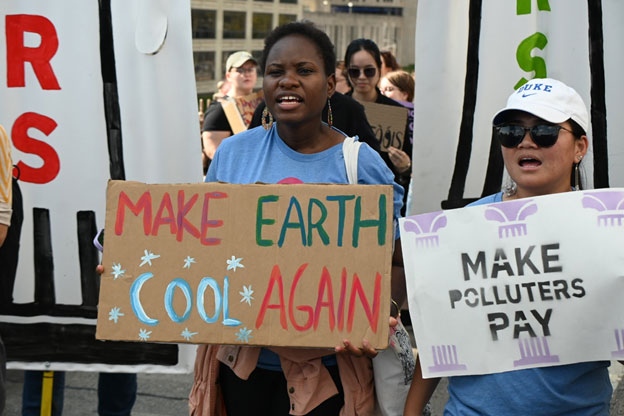NEW YORK, Sep 30 (IPS) – The world is at a critical juncture. Climate change is not just a future threat; it is already here and already destroying lives. From record-breaking heat waves to floods and landslides, the planet is sending us clear signals that we cannot ignore.
But for many of us in the South, this crisis is not new. It is a daily reality that we have lived with for years, despite having contributed virtually nothing to the problem.
I come from Uganda, a contributing country less than 0.02% of global CO2 emissions and is considered the 36th most vulnerable country to the effects of climate change. Growing up on a farm, I saw firsthand how changing weather patterns—flooded roads and mudslides—kept me from going to school.
What was once a reliable planting season turned into a guessing game as to whether the rains would come at all or if they would wash away everything in their path.
Our plantation did not survive. And neither do many others in my region. And in the end, it wasn’t just our farm that was lost; it was our livelihood, our food security and, for me, an entire year of education.
What frustrates me most is that Africa, a continent rich in resources and biodiversity, continues to bear the brunt of a crisis that we did not create. Our people pay with their lives and futures for the emissions and actions of the world’s richest.
According to Oxfam the richest 1% emit as much pollution as the poorest two-thirds of humanity, and their CO2 emissions are enough to cause 1.3 million additional deaths due to heat. The richest remain indifferent to the fact that it is the poorest and frontline communities that pay the price.
According to UNICEF, girls worldwide spend 200 million hours collecting water every day. Think about that for a moment: 200 million hours. The climate crisis makes this burden even heavier.
As water sources dry up, girls are forced to walk further and further, giving up education and opportunities to meet the most basic human needs. By 2030, water insecurity is expected to displace 700 million people worldwide– most of them girls and women. This is not just a climate crisis; it is a social justice crisis.
Despite its negligible carbon footprint, Africa is on the front lines of environmental disasters as the fossil fuel industry continues to rake in record profits. This system is built on injustice. A system where a few benefit while the rest of us suffer. It is a system where the powerful can pollute, and the poor pay the price.
But it doesn’t have to be this way.
We organize in Uganda. I founded Fridays for future Uganda to demand climate justice and fight for a sustainable future where communities can thrive, not just survive. And we are not the only ones. Movements are taking place all over the world Make rich polluters pay are calling for those responsible for the climate crisis – the fossil fuel giants and the ultra-rich – to be held to account.
The solutions are within reach, but it requires the political will to act. Right now, there’s a bill on Governor Kathy Hochul’s desk in New York that could set a powerful precedent. The Climate Change Superfund Act would force major fossil fuel companies to pay their fair share for the state’s climate damage.
Governor Hochul has the power to sign this into law and ensure that ordinary people are not left footing the bill for the climate crisis. We need similar actions around the world.
In November, leaders from the North, including the United States, must agree on a new target for climate finance at COP29 in Baku, which includes taxing ultra-rich corporations and fossil fuel companies. Rich countries, whose emissions have fueled the climate crisis, must step up and take the lead. It is time for the rich polluters to pay for the destruction they have caused.
We can’t wait any longer. The climate crisis is here. The people who contributed least to this crisis are suffering the most. We must hold those responsible to account and demand that they pay for the loss and damage we experience.
The future we want is equal: a future where renewable energy powers our economies, where girls sit in classrooms instead of walking miles for water, and where communities in Uganda, New York and beyond can thrive.
I urge you to take action. There are many ways you can do that. One of these is supporting the Make Rich Polluters Pay campaign by signing the petition and raise your voice. Climate justice is not It’s just a requirement; it is our right. Together we can build a better, fairer future for everyone.
Hilda Flavia Nakabuye is a Ugandan climate and environmental rights activist and founder of Fridays for Future Uganda.
IPS UN Office
Follow @IPSNewsUNBureau
Follow IPS News UN Bureau on Instagram
© Inter Press Service (2024) — All rights reservedOriginal source: Inter Press Service

